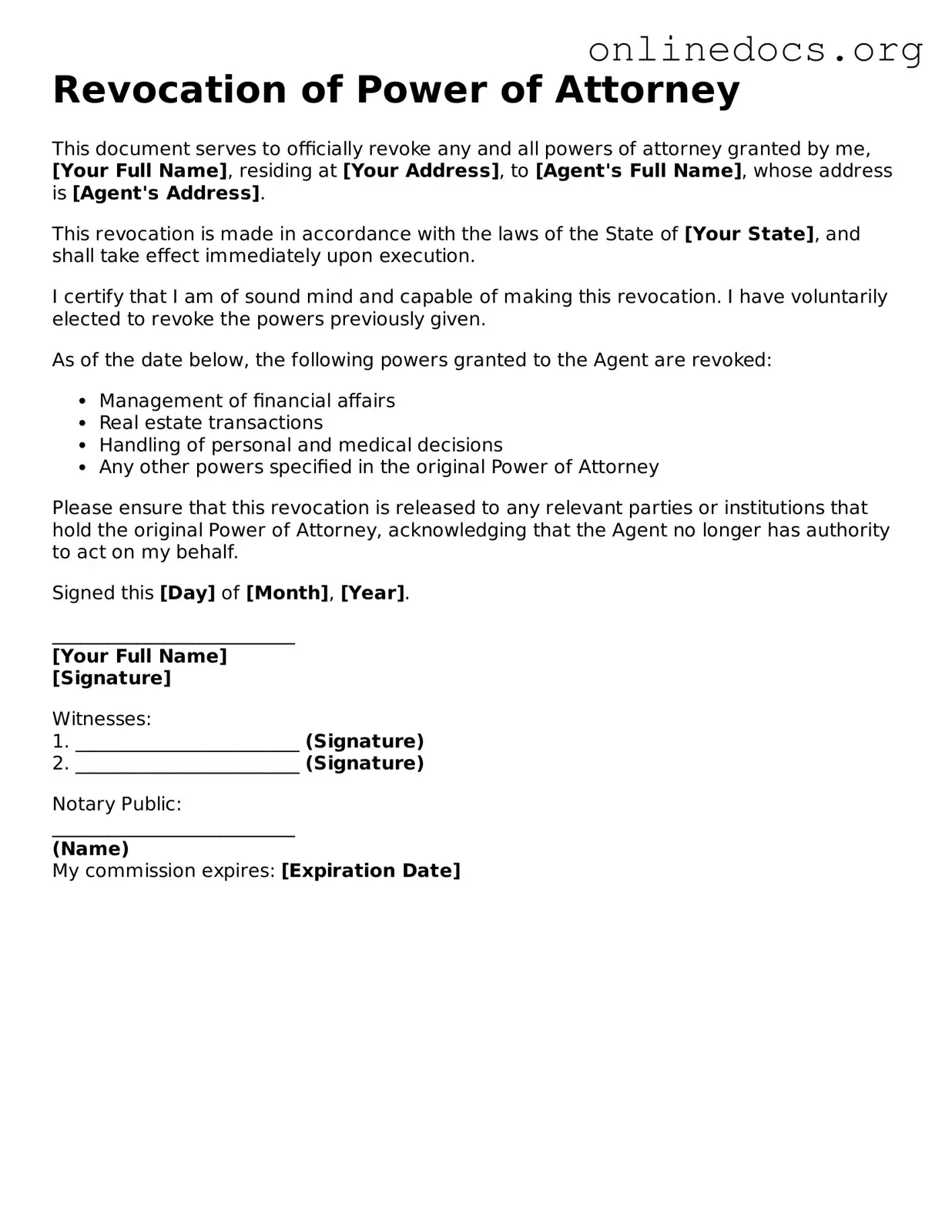The Advance Healthcare Directive is similar to the Revocation of Power of Attorney form in that both documents allow individuals to express their wishes regarding medical decisions. While the Revocation form specifically cancels a previously granted power of attorney, the Advance Healthcare Directive outlines preferences for medical treatment in case an individual becomes unable to communicate their wishes. Both documents empower individuals to control their healthcare decisions, ensuring that their desires are respected even when they cannot advocate for themselves.
The Living Will is another document that shares similarities with the Revocation of Power of Attorney. Like the Revocation form, a Living Will provides guidance on an individual's healthcare choices. It specifies what kind of medical treatment a person wishes to receive or refuse under certain circumstances, particularly at the end of life. Both documents serve to clarify an individual's preferences, making it easier for family members and healthcare providers to make decisions that align with the person's values.
A Durable Power of Attorney is closely related to the Revocation of Power of Attorney form. The Durable Power of Attorney grants someone the authority to make financial and legal decisions on behalf of another person. When the Revocation form is executed, it terminates the authority granted by the Durable Power of Attorney. Both documents are essential for managing one's affairs, but the Revocation form specifically focuses on ending that authority.
The Healthcare Proxy is another document that functions similarly to the Revocation of Power of Attorney. A Healthcare Proxy designates a specific person to make medical decisions on behalf of someone else if they are unable to do so. If an individual decides to revoke a previously appointed Healthcare Proxy, they would use the Revocation form. Both documents ensure that individuals can choose who will make critical decisions regarding their health.
The Will is a legal document that, while primarily focused on the distribution of assets after death, can also relate to the Revocation of Power of Attorney. Both documents require clear communication of an individual's intentions. If a person revokes a power of attorney, it may be part of a broader estate planning strategy that is also reflected in their Will, ensuring that their wishes regarding their estate and health are clearly defined.
The Trust Agreement is similar to the Revocation of Power of Attorney in that it involves the management of assets. A Trust allows a person to designate how their assets will be handled during their lifetime and after death. If a power of attorney is revoked, it may impact the management of assets held in a Trust. Both documents require careful consideration of how one's wishes will be executed and who will carry out those wishes.
The Authorization for Release of Medical Information is another document that bears resemblance to the Revocation of Power of Attorney. This authorization allows individuals to designate who can access their medical records. If a power of attorney is revoked, it may also revoke any previous authorizations for medical information. Both documents are essential for protecting an individual's privacy and ensuring that their medical information is shared only with authorized persons.
Understanding the various legal documents available, like the Power of Attorney form, is essential for individuals to ensure that their wishes are respected. These documents, including the Advance Health Care Directive and the Authorization for Release of Medical Records, provide frameworks for delegating authority to trusted individuals in critical times. For further guidance on such forms, you can visit legalformspdf.com.
The Nomination of Guardian is similar in purpose to the Revocation of Power of Attorney. This document allows individuals to nominate someone to act as their guardian in case they become incapacitated. If a power of attorney is revoked, the individual may also wish to update their nomination of guardian to reflect their current wishes. Both documents are vital for ensuring that individuals have a say in who will make decisions on their behalf if they can no longer do so.
The Financial Power of Attorney is another closely related document. It specifically grants someone the authority to manage financial matters on behalf of another person. When the Revocation of Power of Attorney form is executed, it terminates any previously granted financial powers. Both documents are important for managing financial affairs, but the Revocation form specifically serves to cancel existing authority.
Finally, the Medical Power of Attorney is akin to the Revocation of Power of Attorney. This document designates a person to make healthcare decisions on behalf of another individual. When the Revocation form is completed, it nullifies any previously established medical powers. Both documents are crucial for ensuring that individuals have control over who makes decisions about their health and well-being.
